SSL/TLS Certificate Installation Instructions - Microsoft Exchange 2010

Purpose: SSL/TLS Certificate Installation Guide
For Microsoft Exchange 2010
Need Certificate Signing Request (CSR) help? Please see our technote on how to generate a CSR in Microsoft Exchange 2010 here .
The installation is in three parts:
1) Importing CA certificate using Microsoft Management Console (MMC)
2) Installing the certificate on the server
3) Assign Exchange services to the certificate
Part 1 of 3: Importing CA certificate using Microsoft Management Console (MMC)
1. Click the Download button in the pickup wizard to download your certificate files. Clicking the download button will produce a zip file that includes your Server Certificate, the Entrust chain/intermediate certificates(s) and the Entrust Root certificate. Extract the files from the zip file.
2. On the server, go to Start > Run > type MMC and hit enter.
3. Click File > Add Remove Snap-in.
4. Select Certificates and click Add.
5. Select
Local Computer
or
Computer Account
and click
Finish.
6. Click Close.
7. Expand Certificates on the left hand side of the console window.
8. Expand the Trusted Root Certification Authorities folder and click on the Certificates sub-folder.
9. Right click on the Certificates sub-folder under Trusted Root Certification Authorities and select All Tasks > Import.
10. In the import wizard, browse to the Root.crt file downloaded in step 1 and complete the wizard.
11. In the MMC console, expand the Intermediate Certification Authorities folder. Right click on the Certificates sub-folder and select All Tasks > Import .
12. In the import wizard, browse to the Intermediate.crt file downloaded in step 1 and complete the wizard to complete the certificate chain setup process. You should see your Entrust Intermediate certificates listed in the Intermediate Certification Authorities folder. You are now ready to install your signed server certificate.
Step 2 of 3: Installing the certificate on the server
1. Open the Exchange Management Console as an Administrator. Go to Start > Exchange Management Console.
2. Click on Server Configuration in the left tree. On the right side under Actions, select Complete Pending Request.
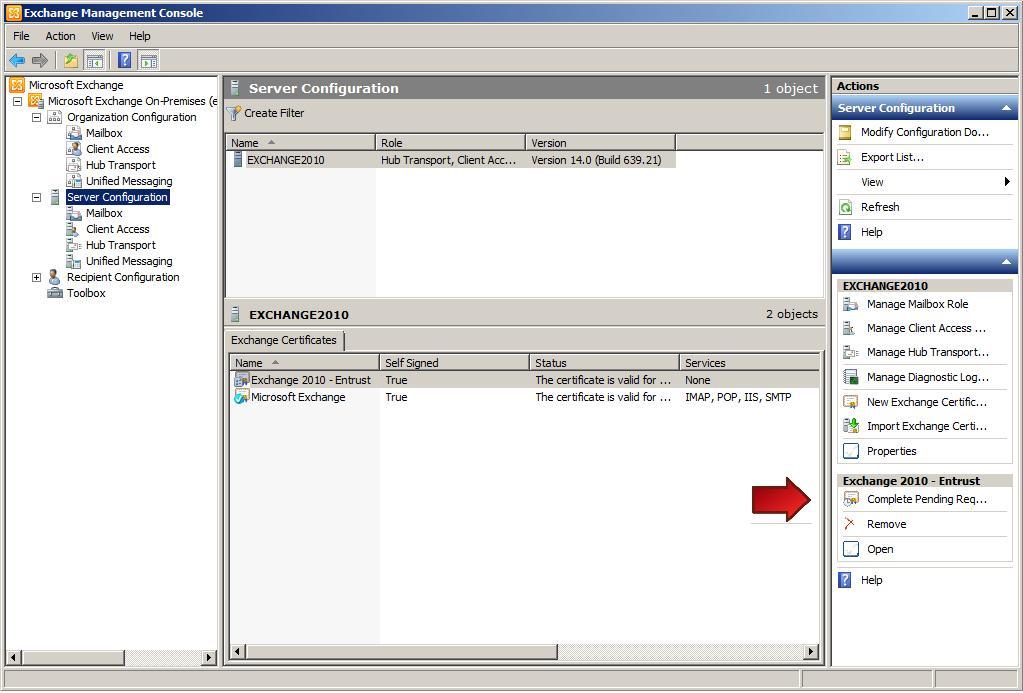
3. Browse to the ServerCertificate.crt file that you downloaded in step 1. Select the file and click Complete.
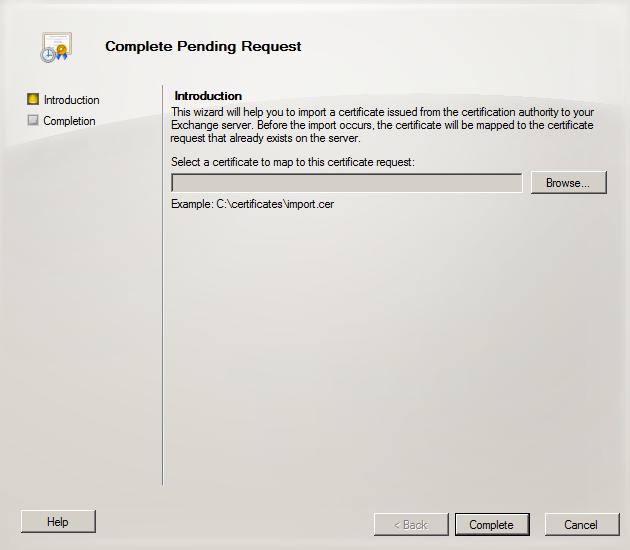
4. A confirmation window will appear. Click Finish.
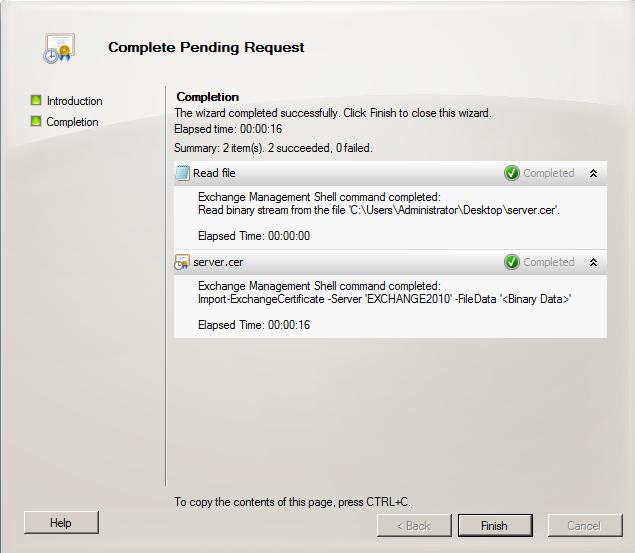
Step 3 of 3: Assign Exchange services to the certificate
1. Now that the certificate is fully imported, you must assign your Exchange services. Right click on the new certificate under Exchange Certificates and select Assign Services.
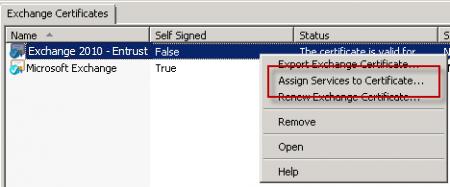
2. Select the name of your Exchange server from the list and click Next.
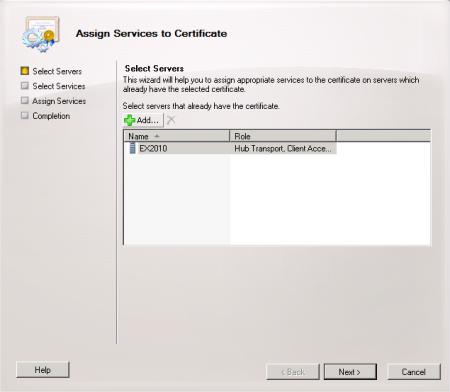
3. Chose the Services that you wish to enable on your Exchange server. In most cases, Internet Information Services (Outlook Web Access, Active Sync) and Simple Mail Transfer Protocol are selected.
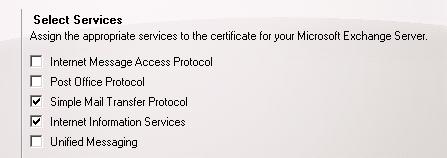
4. Complete the wizard to assign the services to your new certificate. You will be prompted to overwrite the existing certificate. Click Yes to overwrite and complete the process.
|
|
Your SSL/TLS certificate should now be installed. |
Check that your Certificate has been successfully installed by testing it on the
Entrust SSL Install Checker
.
If you have any questions or concerns please contact the
Entrust Certificate Services Support
department for further assistance:
Hours of Operation:
Sunday 8:00 PM ET to Friday 8:00 PM ET
North America (toll free): 1-866-267-9297
Outside North America: 1-613-270-2680 (or see the list below)
NOTE:
It is very important that international callers dial the UITF format exactly as indicated. Do not dial an extra "1" before the "800" or your call will not be accepted as an UITF toll free call.
| Country | Number |
| Australia |
0011 - 800-3687-7863
1-800-767-513 |
| Austria | 00 - 800-3687-7863 |
| Belgium | 00 - 800-3687-7863 |
| Denmark | 00 - 800-3687-7863 |
| Finland |
990 - 800-3687-7863 (Telecom Finland)
00 - 800-3687-7863 (Finnet) |
| France | 00 - 800-3687-7863 |
| Germany | 00 - 800-3687-7863 |
| Hong Kong |
001 - 800-3687-7863 (Voice)
002 - 800-3687-7863 (Fax) |
| Ireland | 00 - 800-3687-7863 |
| Israel | 014 - 800-3687-7863 |
| Italy | 00 - 800-3687-7863 |
| Japan |
001 - 800-3687-7863 (KDD)
004 - 800-3687-7863 (ITJ) 0061 - 800-3687-7863 (IDC) |
| Korea |
001 - 800-3687-7863 (Korea Telecom)
002 - 800-3687-7863 (Dacom) |
| Malaysia | 00 - 800-3687-7863 |
| Netherlands | 00 - 800-3687-7863 |
| New Zealand |
00 - 800-3687-7863
0800-4413101 |
| Norway | 00 - 800-3687-7863 |
| Singapore | 001 - 800-3687-7863 |
| Spain | 00 - 800-3687-7863 |
| Sweden |
00 - 800-3687-7863 (Telia)
00 - 800-3687-7863 (Tele2) |
| Switzerland | 00 - 800-3687-7863 |
| Taiwan | 00 - 800-3687-7863 |
| United Kingdom |
00 - 800-3687-7863
0800 121 6078 +44 (0) 118 953 3088 |
